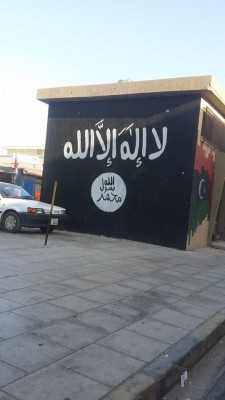Benghazi, 21 March 2015

By Mohamed A Shaikhi
Four years ago Libyans came together as one body to overthrow the tyrant Qaddafi and win their freedom after four decades of dictatorship. Qaddafi was toppled in 2011 with the support of the international community.
Four years on, and Libya with its oil riches, has been sliding into a civil war since the Islamist-leaning militias of Libya Dawn took over the capital Tripoli last summer. Dawn supporters lost last June’s free and fair democratic elections, when Libyans selected a new parliament, the House of Representatives (HoR).
In occupying Tripoli, Libya Dawn forced the internationally-recognised HoR and its government to base itself in Tobruk (some 1400 km east of the capital).
Libya Dawn then revived the old parliament, the General National Congress pulling in a small group of former members, which in turn appointed a government led by Omer Al-Hassi. This parallel parliament and government in Tripoli competes with the internationally-recognised parliament and the government in the east of the country.
By May 2014, Benghazi, the second largest city, had for almost two years been under the control of Qaeda-linked Ansar Sharia armed groups, almost becoming a state within the city. There were hundreds of assassinations of police and army figures, journalists, activists lawyers and judges. Police stations were completely destroyed.
Then former general Khalifa Hafter, launched his Dignity (Karama) operation to drive the Islamists out of the city. Scores of people have died and many more been injured in a battle which has proved the most fierce since Libya’s liberation. Originally working with serving and former army officers as well as local militiamen and tribesmen, his operation gathered momentum and has cleared much, but by no means all, of the city of Islamist militias. The HoR has since reappointed him to the Libyan National Army of which it has made him Commander-in-Chief.
The GNC in Tripoli accuses Hafter of mounting a coup in an attempt to emulate Egypt’s Abdel Fattah El-Sisi. They also claim that he and his followers are supporters of the old Qaddafi regime. By contrast they maintain that the militiamen of Ansar Al-Sharia, who renamed themselves the Shura Council of Benghazi Revolutionaries, (SCBR) are the real “thuwar” (revolutionaries).
Yet the fighters of SCBR were waving the black flag of Al-Qaeda all over Benghazi and their main base at Derna (some 400 east of Benghazi). The group was commanded by Mohammed Zahawi. When Hafter launched the Karama attack, Zahawi, who before he became involved with Islamist militias, had been a drummer in a folk band, stood in front of a black Al-Qaeda banner and said: “ Hafter is supported by Western countries which are enemies of Islam. He claims he is fighting terrorists. But there is no room for any rule in Libya but Islamic Sharia”.
The GNC, which had stayed silent over the mass of murders in Benghazi, still stayed silent at Zahawi’s clear claim that he was a member of Al-Qaeda and was pursuing their violent ends.
Instead the GNC and Libya Dawn continues to insist that Hafter was being confronted by the real Thuwar. Even when much of Ansar Al-Sharia had morphed into Islamic State and declared its allegiance to IS leader Abu Bakr al-Baghdadi, Libya Dawn continued to insist that Zahawi and his people were the real revolutionary fighters.
But the wilful lack of reality goes further. Even when Islamic State said it was responsible for the murderous February attack on Tripoli’s luxury Corinthia Hotel, Libya Dawn insisted that the assault had been carried out by Qaddafi’s followers.
Later that month, when 21 Egyptian Copts were beheaded by IS in Sirte, (some 400 km east of Tripoli) Libya Dawn again immediately blamed Qaddafi loyalists.
Now Libya Dawn forces, in the shape of the Misratan 166 Brigade are fighting IS in Sirte. One of the IS leaders, Tunisian Ahmed al-Rouissi was killed this week and the terror organisation is in public mourning for him. Yet Libya Dawn continues to insist that this Tunisian and the other IS terrorists are Qaddafi loyalists.
Indeed at a recent press conference Libya Dawn prime minister insisted: “Hafter and Qaddaf Adam (Qaddafi’s cousin now in Egypt) are supporting these terrorist groups to return the former regime but we, the real Thuwar, will not allow this happen”.
But Dawn is tying itself into ever tighter knots in trying to claim that IS terrorists are Qaddifi loyalists and Ansar Al-Sharia are the real Thuwar.
When a car bomb went off last December outside the HoR building in Tobruk, Naba, the Islamist-leaning TV channel in Tripoli, produced a military expert, Mohamed Al-Naas, who said that car bombs are “a new strategy of Thuwar”.
The station also refuses to use the term “Islamic State”, saying instead “a terrorist group adhering to the Islamic state”.
If IS/Ansar terrorists are killing militiamen from Libya Dawn in Sirte, they are Qaddafi supporters. However if they are killing members of the Libyan Nation Army in Benghazi, they are revolutionaries.
To add to this absurdity, the international community recognises the House of Representatives and the government of Abdullah Al-Thinni. Most diplomats have withdrawn from Tripoli. UK ambassador Michael Aron, speaking from Tunis, said this week that ambassadors would love to return to the capital but that to do so would imply recognition of the Hassi government and the GNC. Hanging in the air after he said this, was the obvious question, why have the diplomats and the United Nations and the EU not upped and moved to Tobruk, to be alongside the legislators who they all recognise were chosen by Libyans to guide their country towards democracy and stability?
Opinion articles do not necessarily represent the views of the Libya Herald. [/restrict]




